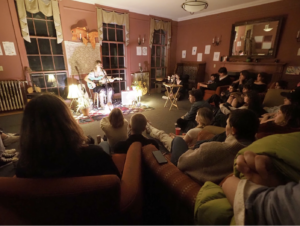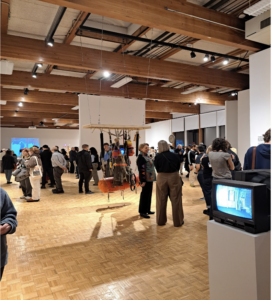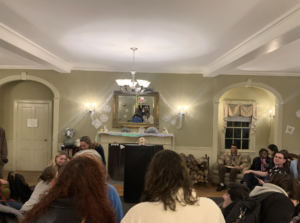James Baldwin’s mastery of language in writing is a household fact. His fame and power resonates with readers still today, thirty-four years after his death in 1987. His literary credits—from Go Tell It on the Mountain to Notes of a Native Son—are masterful examples of fiction, of the philosophical, intellectual, and deeply human tendency for Baldwin to touch that part of us that compels us to stop, look at our peers, the world around us, and say “he is right; how could I have been so blind?” Although the body of his work mainly embodies the racial and class divisions in America, he departs from this commonality with Giovanni’s Room, a work of fiction set in Paris that discusses the intricacies of sexuality and morality, the harm the latter inflicts upon the soul when the former is pigeon-holed through a binary society that considers homosexuality as demoralizing, and the tragedy that eventually follows denying the inherent truth that humans are fluid beings, and to be liberated means to love with the same level of freedom. In a slim 166 pages, Baldwin provides this insight with the reservation of muted prose, which explodes into sweeping philosophy as he braces the reader for a profound upset of the status quo.
Baldwin’s narrator—an American expatriate in Paris named David—opens the story with the framing of a tired white man, who, despite his acknowledgment that his, “ancestors conquered a continent, pushing across death-laden plains, until they came to an ocean which faced away from Europe in a darker past” is dripping with melancholy and alcohol, as he stands gazing out of a window in the south of France. He may be “drunk by morning, but that will not do any good.” David exists in a single space in time, referring to both the past and the future; tomorrow, he will take the train to Paris, but what consumes his thoughts (and the rest of the book) are memories of “those nights” in Paris (which were not too long ago,) those nights where there was “no one to watch, no penalties attached” to his actions until that very liberty unraveled him. He is now—and always has been—threatened by freedom; he is engaged to a woman, Hella, whom he loves but uses nonetheless as something to be “moored” to. Even so, he recognizes the inability for one to tether themselves anywhere; “Life gives these and also takes them away, and the great difficulty is to say yes to Life.” David struggles to do this, especially when Giovanni enters his life, with whom he first becomes aware of “another person’s body, of another person’s smell.” Yet he is threatened by this, fearing the loss of his “manhood.”
David lost his mother, and his relationship with his father is tumultuous at best. They are comfortably middle-class with enough money for him to possess an allowance from his father, but not enough to satisfy David beyond the rank of pity and mediocrity. His father, suffering the death of his wife, turned to drink and visiting prostitutes. David grows to despise his father and his pitiful state of being, cringing when the latter seeks desperate validation, struggling to “ever face a woman without wondering whether or not my father had…been ‘interfering’ with her.” The last thing David wants is a life like his father’s, desiring instead to maintain the respectful distance of “father and son.”
From the beginning, Baldwin provides us with a complex yet unlikeable narrator. His ambivalence towards the world is less of a stance of wisdom and moreso comes from a place of inertia. He struggles with the vision of his father as decrepit, broken, drunk, a womanizer, as his father is a mirror of his own constitution given their proximity and shared trauma surrounding his mother’s death. This reaches the point where David cannot even look a woman in the eyes without thinking of his father’s sexual history, a disturbing preoccupation that is telling of David’s state of mind. He is surrounded by fragility, yet worships the concept of “manhood” and power. He muses in the introductory paragraphs about how his ancestors conquered and colonized America, while his relationship with Giovanni, the only person with whom he has ever felt a true, erotic, and spiritual love, unsettles him as it challenges his perception of masculinity.
Thus, David wanders under those structures that create his unhappiness, that prevent him from acquiring a genuine love. Rather than acknowledge his passion with Giovanni, he lets the threat to his “manhood” consume him, and he remains “moored” to heterosexual relationships with women just to keep himself grounded in normality. His acknowledgment of his colonizer ancestors likewise establishes him as both a constituent and worshipper of those same power systems that were established in America. Whiteness, patriarchal power, wealth, all of these are items that preoccupy Giovanni. However, he struggles to find his place in those same constructions; he cannot happily belong in these power structures, however, he worships them nonetheless, to the point where he cannot enjoy “Life,” or be comfortable with the man who has embraced his being with the passion of eternal love. Systems of power damn him as they destroy his ability to enjoy life; nonetheless, he relies on them, as he is threatened by deviance.
David meets Giovanni at a bar (the latter was employed there for some time before being fired, making him financially dependent on David’s allowance,) and they speak of their home countries. Giovanni mocks the absurd rigidity with which Americans dictate their lives; “these people and their measures! They measure the gram, the centimeter, these people, and they keep piling all the little scraps they save…what do they get out of all this measure? A country which is falling to pieces, measure by measure, before their eyes.” As David is taken with this man, he feels as though he is being watched all the same, as though he were in a “zoo.” Nonetheless, David continues to see Giovanni, and he is faced with the truth; that he loves this man, despite having a fiancee in Spain, and he was “in a box for I could see that, no matter how I turned, the hour of confession was upon me and could scarcely be averted; unless of course, I leaped out of the cab, which would be the most terrible confession of all.” In Giovanni’s face, he sees “under his beauty and his bravado, terror, and a terrible desire to please; dreadfully, dreadfully moving, and it made me want, in anguish, to reach out and comfort him.”
Almost immediately, David regrets this affair, feeling himself so “hideously entangled with a boy,” yet he cannot keep his affection back, his passion and his desire, which they finally consummate in Giovanni’s room. As David is pulled into Giovanni’s body, the entirety of his body screams “no;” yet, the very “sum” of his being, that entirety of humanity lurking beneath his skin, sighs out “yes.” The room itself became a paradise, a space apart from time, seeming to drift beneath the very depths of the sea, and their “life together held a joy and amazement which was newborn every day.” Even so, he cannot escape his fear generated from the rigid moral structure he worships. Meanwhile, Giovanni openly notes that he is not in the mood for women “right now,” his sexual fluidity bearing opposition to David. David wants to enjoy his life, and he feels safe and happy with Giovanni. He begs himself to “stop fighting,” and allows himself to be held in Giovanni’s hands, to “make [him] whole again.” Nevertheless, Hella returns from Spain and is reunited with David, who subsequently abandons Giovanni, leaving him to cope with the pressures of solitude, driving him to murder the bartender who sexually exploited him in the past (and attempted to do so again after David left Giovanni, as the latter was desperate for money and an escape from solitude.) David, coping with the murder, the arrest of Giovanni, and the prospect of being with a woman who he did not truly love, disappears for several days and sleeps with a sailor, only to wake up in the morning to see Hella, knowledgeable now of his sexuality. Hella leaves David, not because of his sexuality, but because he was dishonest with her, hiding this fact, leaving her in a trail of unhappiness as David’s own depression shambled her self-esteem. David, now completely alone, recognizes how he could have loved. Nevertheless, he is alone.
Baldwin’s genius in this book arises to fruition as the affair is carried out throughout the novel. David is at his happiest and most powerful, with Giovanni. His room becomes a place of respite, a self-constructed world apart from David’s Americanized rigid moral institutions, similarly to how the Underground Man finds comfort in “the underground,” and the Invisible Man in his light-filled basement. But unlike these two literary figures, who use these locations as freedom from a world whose social barriers produce a damning bitterness, David gives in to his fear, gives in to social binaries, and decides to hide and repress his love for Giovanni as his fiancee returns from Spain, thinking he could assimilate back into the structures he relies on as reinforcement and validation of his being. However, he is more isolated than before as a result of this; his fiancee leaves him, betrayed by the lack of honesty, by the fact that David can never love her with genuine feelings (or, in fact, love anyone genuinely because of his panoptic insecurities,) while Giovanni is set to be beheaded for a murder that resulted from David’s abandonment. Baldwin paints us a picture of the truth behind sexual oppression; it kills the individual, as heteronormativity chokes the true spectrum on which lies our romantic desire. Moral institutions that support masculine, patriarchal, and homophobic power structures, idealizing those very same alignments along a binary system, thus do more harm than good under Baldwin’s critique, presenting us with the idea that in order to bypass this, we must love for love alone rather than settle for that which feeds the moral void within us, that very same morality which is generated by social demands. We ourselves must “say yes to Life,” as Giovanni did before he was executed, and as David almost did before retracting back into the comfortable discomforts of systemic society.
Through the plot—although slow and, at times, repetitive, given the muted nature of the book itself (not much really happens, rather, the book is constructed along three planes: pre-Giovanni, with Giovanni, and post-Giovanni)—Baldwin is able to use his command of language as a means of giving us insight into the full emotional depth David is confronted with. The muted, short, terse sentences echo Hemingway’s prose style, a syntax that parallels David’s own repression (much like how Hemingway’s characters themselves usually worship conservative masculine structures, the very same that make them unhappy, to the point where Hemingway himself struggled to tarry within those structures much as David did.) Yet the prose swells into familiarity as he returns to his sweeping prose, riddled with commas that, in the 19th century, become barriers to readability but with Baldwin are marks of the natural intellectual, the continuous philosophizing of the human monologue, running on as his sentences tend to (as mine may as well as this book, and its glories, incite me to thought,) with accessibility unseen in many. He gently calls on us to walk with him through the pillars of society, to breathe the air he breathed, that we breathe now, that David in fiction does, such that we may gaze outward into the depths of society, to find that hand which constricts the passions of living, those passions which upset the status quo and give us permission to live as we choose to, to love as we wish, and to feel as deeply as is necessary in the face of institutional indoctrinated barriers.

Dylan Walawender is a first-year student studying literature and creative writing, with a little bit of philosophy and psychology worked in there. He enjoys reading, writing, and nature stuff like hiking, finding plants, things of that alignment.
Book Reviewer, Cultural Examination Columnist, Website Team Member, Journalistic Education Team Member













Be First to Comment